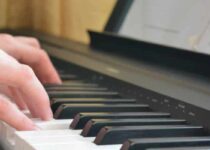Are you thinking about learning how to play the piano as an adult? If so, you might be looking forward to tackling a new challenge. Learning to play a new instrument can be a lot of fun, and as an adult you have the ability to really appreciate what you’re doing.
But it can also be harder to learn piano at an older age. The primary reason for this is that adult’s brains have lower neuroplasticity than children, meaning it can be harder for the brain to create new neural connections. However, learning piano later in life is still entirely possible, and even offers a range of significant cognitive and emotional benefits.
In this post, we are going to take a look at some of the challenges that come with learning the piano at an older age, how you can overcome these challenges, and the benefits of doing so.
Post Contents
Why You May Want to Take Piano Lessons at an Older Age
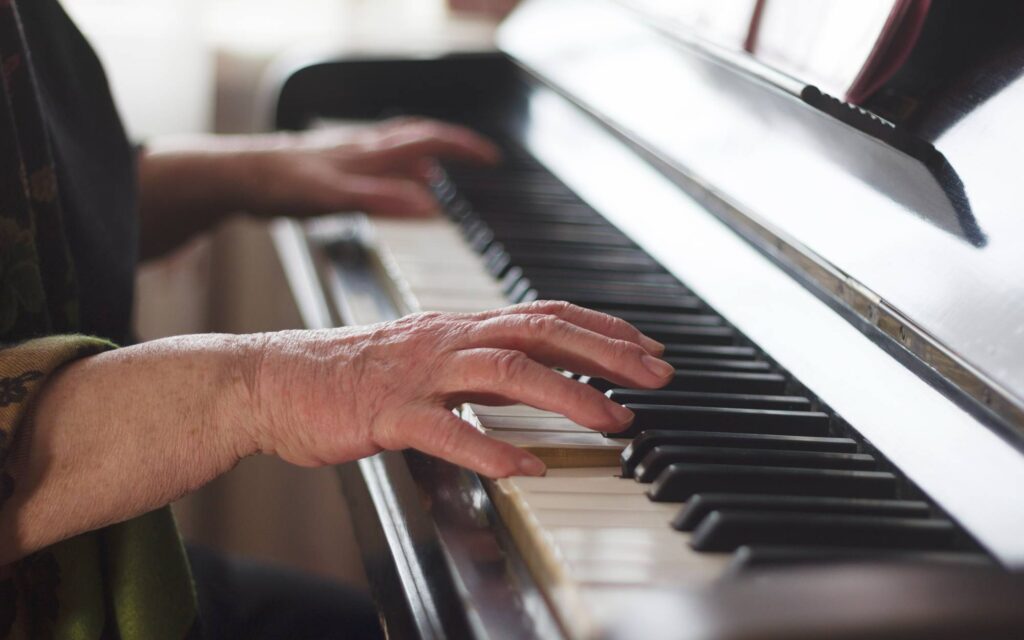
Many parents sign their kids up for piano lessons at an early age. However, a young child often does not appreciate the ability to play piano until they get older. Most children may be more interested in playing video games or sports, and don’t necessarily want to put in the time and energy to learn the piano.
Then, adult students realize how much fun it can be to learn the piano. They see the joy on other people’s faces when someone is playing the piano, and they are looking for a new hobby. Or maybe they inherited the old family piano, and don’t want it to go to waste. They think they may really enjoy playing the piano. So they decide to become a piano player.
However, it can be more difficult to learn how to play the piano as you get older, vs someone who started learning as a young child. Younger people do have several advantages when it comes to learning any new skill. But it’s entirely possible for older students to overcome their disadvantages, and they even have their own advantages over their younger counterparts. There’s no reason you can’t start piano lessons as an adult.
That being said, why do older piano students struggle when playing the piano?
How Neuroplasticity Affects Playing Music at an Older Age
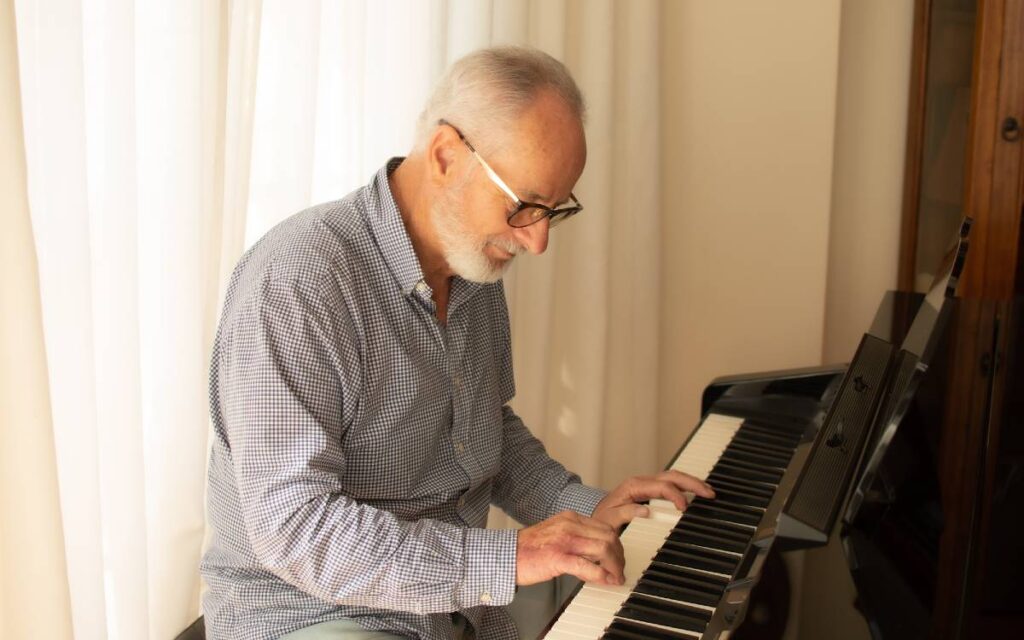
The biggest reason why adults have a difficult time learning how to play the piano as they get older, is that the adult brain has less plasticity compared that of a child. Brain plasticity, or neuroplasticity, refers to the brain’s ability to change its structure and create new neural connections.
Children’s brains are extremely plastic. They have to be, since they are learning about the world and need that plasticity in order to adapt and make the required neural connections. Teenagers and young adults also have very plastic brains, though they aren’t quite as sponge-like as those of young children. This is a huge benefit when learning new skills such as music.
Neuroplasticity begins to decline as we age, meaning adult brains are less able to restructure themselves and form new neural connections. For this reason, learning piano can be more difficult for adults than it is to start learning at a young age.
But neuroplasticity doesn’t go away entirely. Scientists used to think that our neural connections were locked in at around age 25, however more recent research has shown that brain plasticity continues well into adulthood. And certain habits, such as exercise and learning new things, can even enhance you brain’s plasticity as you grow older.
The bad news is that lower brain plasticity may make it somewhat more difficult for adult students to pick up the piano. The good news is that deciding to learn an instrument will actually encourage that same brain plasticity, enhancing cognitive function and making it easier to continue learning new skills, like playing music.
So learning to play piano as an older student brings with it a range of cognitive benefits that will help keep your brain in tip top shape as you age. But there are definitely challenges as well.
Is It Hard to Learn Piano at an Older Age? Top Challenges for Adults
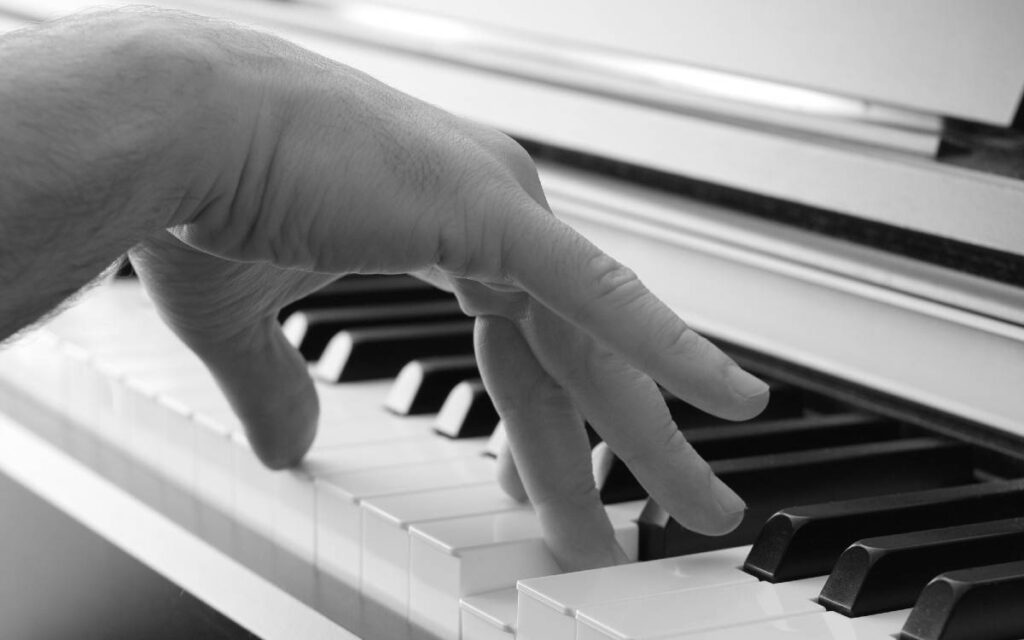
There are some challenges that adults need to overcome if they want to learn piano. A few of the biggest challenges include:
Finding the Time
Without a doubt, there are many adults who have a difficult time learning piano because they cannot find the time to take lessons, let alone practice music every day.
Think about everything you have on your plate that you need to do. You need to go to work. You might have kids you need to take care of. You might have to go to the gym every day. When all is said and done, is there time for learning the piano? If you want to get better at playing piano, you need to find the time to practice.
On top of that, taking lessons is often a good idea when learning to play, which is a time commitment.
Looking for the Motivation
There are other adult learners who struggle to find the motivation to practice every day. It can be easier to find time for consistent practice as a child because you have fewer responsibilities, and you might have parents getting on your case to sit down for piano practice after school.
But when you’re an adult, it’s all on you. If you don’t practice the piano, nobody is going to yell at you to do so. You need to find the dedication within yourself to establish a routine of consistent practice sessions.
You don’t need to be highly motivated, but you do need to be consistent. Don’t feel overwhelmed thinking your practice sessions need to be long. Short sessions of just a few minutes will go a long way when it comes to learning the piano.
But even with regular practice, you won’t learn the piano overnight. It can take years to develop your skills to the point where you can play songs that you want to play. So working on maintaining your motivation, but more than that your discipline, is extremely important.
The Expense of Piano Lessons
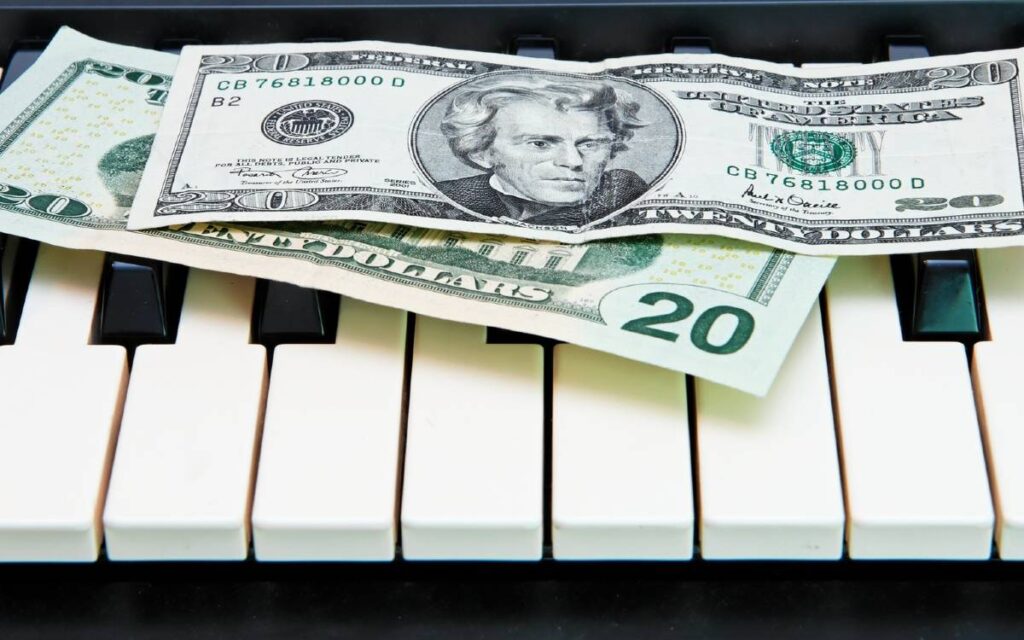
When it comes to learning the piano, it’s tough to beat taking piano lessons. There are a lot of skills to learn, like proper technique, fingering, and reading sheet music, that are much easier to establish with the guidance of a teach. But the cost of lessons can really add up, and might be unaffordable for some adult learners.
You could spend between $40 and $60 for a one hour lesson, which you’ll probably have once per week. Again, this can really add up. However, you can think about reducing your costs by taking group lessons or even online lessons.
The piano itself is also an expensive instrument – far more expensive than a guitar. But there are ways to find an affordable piano as well. You can take a look at buying a used piano, or even looking at free pianos listed online (although, even a free piano usually requires you to pay hundreds of dollars to move it and have it tuned).
Another option is to go with a good digital piano for learning to play. Digital pianos are far cheaper, and also don’t require constant maintenance. Just make sure to get a good keyboard that features weighted keys, or better yet, hammer action. That way you’ll still develop much of the proper technique that you would when learning the piano on an acoustic.
The Brain is Not As Malleable
It may actually take adults longer to learn how to play piano because the brain is not nearly as malleable as it once was. This goes back to neuroplasticity, like we talked about earlier.
This makes it easier for children, teenagers, and young adults to grasp difficult concepts associated with learning to play piano. Kids are also tend to be more creative than adults.
But adults, and even older adults, can still learn piano. It just might take them longer, and require more dedication and consistency. While there are certainly challenges that come with learning to play the piano as an older student, there are a variety of ways to overcome these challenges.
How To Overcome Challenges Associated with Learning the Piano
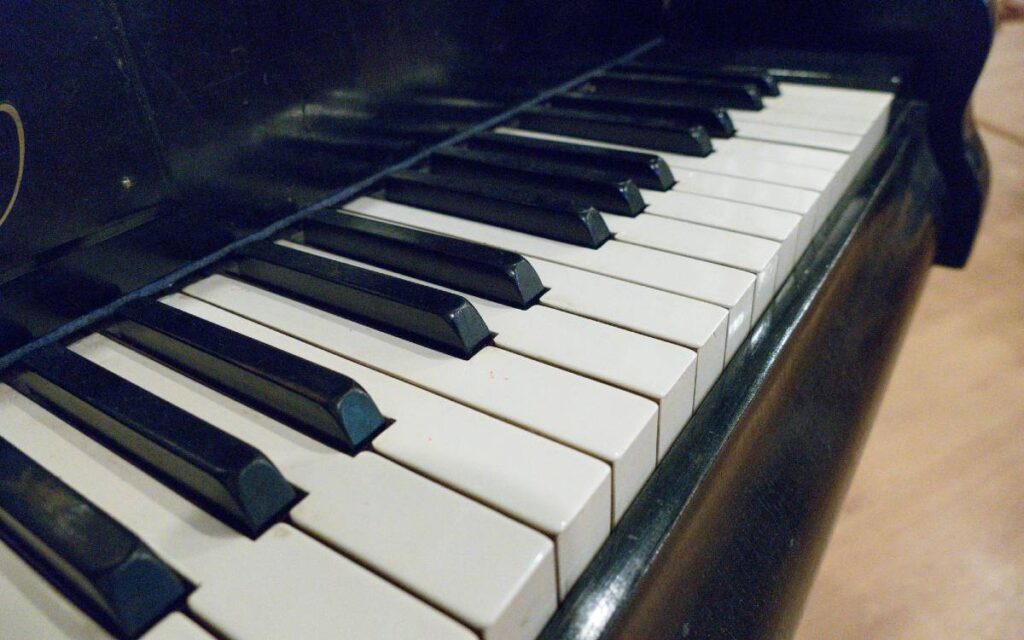
Clearly, there are a lot of challenges that come with learning how to play the piano; however, there are a few tips that adults can follow as they’re learning to play this new instrument.
Find Music You Want To Learn
If you want to learn the piano, you need to have fun. The best way to do this is to find piano music you want to learn. As a child, you might have been told what to play. When you take lessons, most piano teachers are going to suggest piano music for you to learn. But you still have the final say regarding the music that you play.
For example, you might want to take a look at a list of beginner piano songs that could be helpful for you. If you find music you want to learn, you will be more likely to practice every day.
Pick a Piano Teacher That is Right for You
There’s no doubt that lessons offer many benefits when it comes to learning an instrument at an older age. But before you start piano lessons, you should make sure to find a teacher who is right for you.
If you have a friend who is a pianist, see if they know of any teachers in the area who might be willing to teach you. You might benefit from group lessons, or you might benefit from the structure and individual attention of a private lesson. See if there is a way you can ease your way into lessons.
If you can find a teacher you can relate to, you will have an easier time sticking to the rigor of taking lessons once per week. Finding the right teacher can make all the difference in your musical journey.
Schedule Your Practice Time in Advance
Your piano practices are not going to schedule themselves. If you want to learn how to play the piano, you need to practice. If you want to practice, you need to schedule it into your life.
Too often, people simply go throughout their days waiting for a time to practice to magically show up. This is not going to happen. By the time you finally feel inspired, you will be too tired to practice. Do not let this happen to you. Instead, make sure you schedule your practice sessions ahead of time. If you are intentional about making time to practice, you will be more likely to do so.
You might even want to write your practice time into the calendar on your phone and set up reminders, so that you always know exactly when it is.
Again, don’t think every practice session has to be an hour. You’ll still get many benefits from practicing for 5 or 10 minutes or there. When it comes to learning piano, a little bit of practice is always better than none at all.
Keep the Piano in Tune
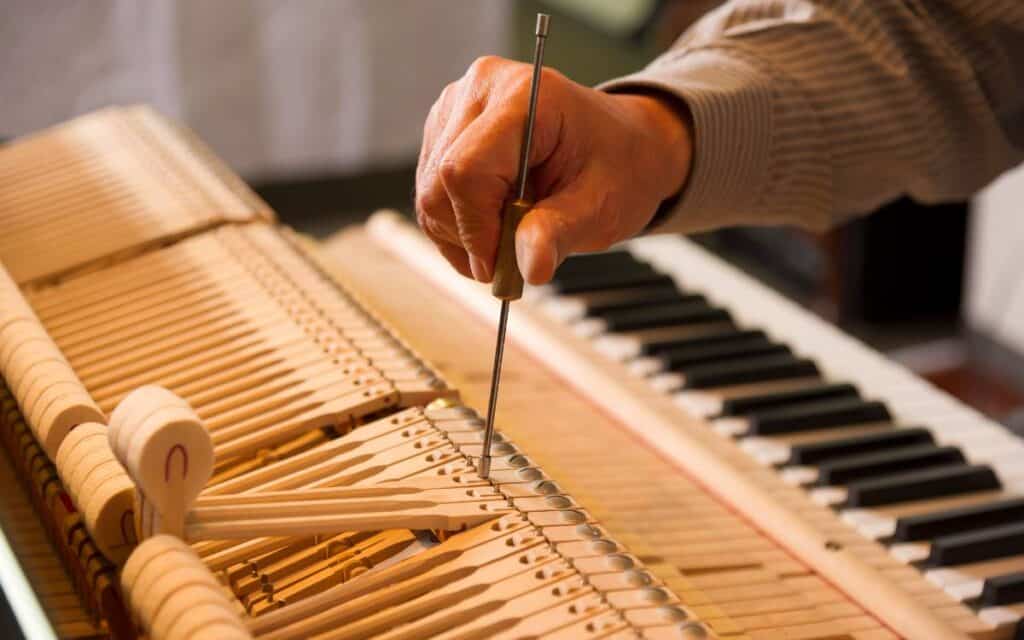
Another key tip you need to follow is to keep the piano in tune. Pianos require tunings at least once a year (twice a year is better, especially if you play frequently). And if you don’t stay on top of this, you may find yourself with an out-of-tune piano that just isn’t fun to play.
If you spend the time and money to get the piano tuned, you will be more likely to play it. If you recently bought a piano, you need to give it at least two weeks to acclimate to its new environment. Then, you should get it tuned up to pitch.
Of course, if you start your learning on a digital piano, then you won’t have to get it tuned. That’s one advantage that a digital piano has over an acoustic one.
Journal Your Practices
You should also keep a journal of your practices. Your piano teacher may give you a notebook to keep track of the pieces you are playing. B you might want to keep a journal of the technical aspects of your practices as well.
There are a few notes you should write down. It’s a good idea to keep track of what is working well for you, what you are struggling with, and how much you practice every day. You should keep track of the technical exercises you are practicing. You should show all of this to your teacher, so they can tailor your lessons to target areas that you would like to improve. This can make a major difference when you are trying to get as much as possible out of your lessons.
These are just a few of the most important tips you need to keep in mind if you want to overcome the challenges of learning how to play the piano at an older age.
The Benefits of Learning Piano as an Adult
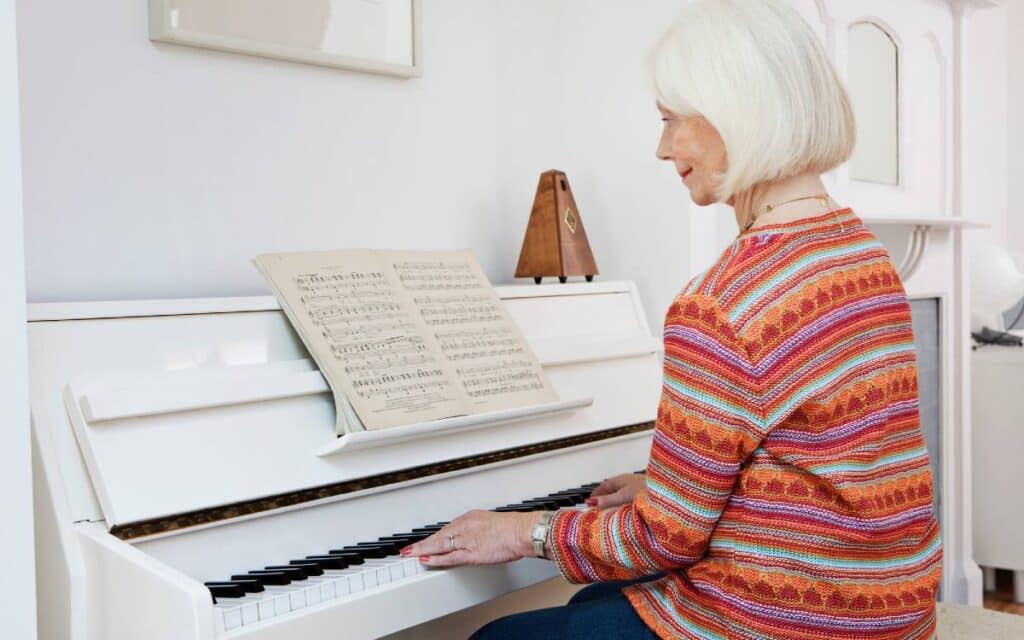
If you are able to overcome these challenges and learn how to play piano, there are several benefits you will enjoy, no matter when you started playing.
You Can Reduce Your Stress
One of the biggest reasons why people love to learn to play the piano is that this is a great way to relax after a long day. Many people compare this to going to the gym. You get to do something totally different and challenge yourself in a new way. Thus, playing can help you relax and unwind.
Ultimately, learning how to play the piano is a great way to reduce your stress and improve your life. There is nothing quite like sitting down at the piano at the end of the day, and feel the music release your tension.
You Can Improve Your Cognitive Abilities
Another major benefit of learning how to play the piano at an older age is that you can improve your cognitive function. There are lots of people who learn piano as a way to prevent the development of certain neurological issues later in life. This is especially important for elderly students.
Learning how to play the piano works both sides of your brain, and also exercises your fine motor skills. This is a great way to encourage new neural connections that can help you improve your cognition, and keep your brain healthy as you age. Playing piano has even been shown to make people smarter.
You Can Develop Stronger Relationships
If you learn how to play the piano, this might help you widen your social circle, and even develop stronger relationships with friends and family. Playing the piano and getting involved in music is a great way to meet new people with common interests, and deepen you existing relationships.
Playing the piano helps you develop skills that improve relationships, such as listening, compassion, and expressing yourself. Performing for your friends and family is a great way to show them something else from inside of you, and deepen your connection.
You Can Enjoy Personal Satisfaction
Ultimately, there are plenty of reasons why you should learn how to play the piano, but the biggest reason why you should learn to play is for yourself. Embarking on a journey to learn a new skill is a significant challenge, but it is one that you can overcome. It is worth it if you can learn to play the piano.
Think about some of the biggest challenges in your life that you have had to overcome. Think about how good this made you feel. You can do the same thing if you learn how to play the piano. The personal satisfaction of learning how to play a musical instrument is significant.
Although there are some challenges to work through, age is really just a number. No matter how old you are, you can do anything you set you mind to. If you put in the time and effort to learn how to play the piano later in life, it will pay off, and you’ll find yourself making beautiful music for the rest of your life.




